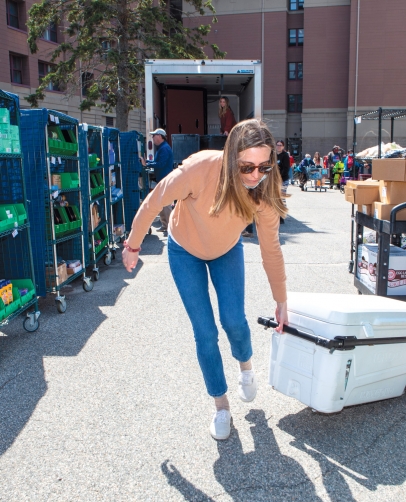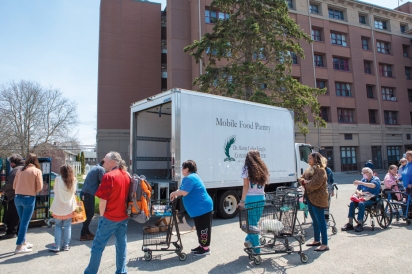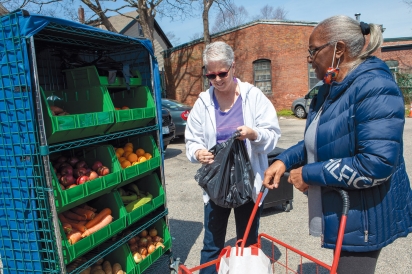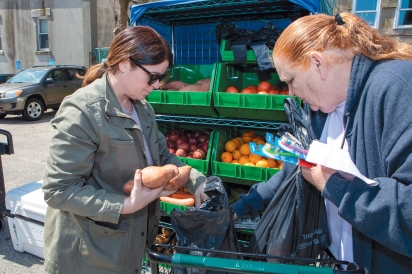Mobilizing Food at the Dr. Martin Luther King, Jr. Community Center
A Pantry on Wheels Brings Nourishment to the People
When the Dr. Martin Luther King, Jr. Community Center’s (MLK) mobile food pantry arrives at Donovan Manor in Newport, residents of this age 62+ public housing complex stand in line eagerly. It’s the third Thursday of the month, and this is their opportunity to get free fresh fruits and vegetables, bread, eggs, milk and meats that are increasingly expensive to purchase.
Rebecca Allen is here with her shopping bags, a kind smile and an answer for everyone. As resident services liaison for the Newport Housing Authority and a tenant at Donovan Manor, Allen helps her neighbors with everything from groceries and medical referrals to Social Security paperwork. Through this unique lens as resident, employee and shopper, Allen sees the struggle for adequate, healthy food as the bane of their existence.
“There has been an extreme increased demand because of inflation and rising prices. Even though [residents] had increased food stamps [from the Supplemental Nutrition Assistance Program/SNAP], food is still unaffordable,” Allen says. Monthly SNAP benefits were increased in March 2020 as an emergency measure to help with economic losses caused by the Covid pandemic. The federal government is now ceasing or “sunsetting” the increase as of March 1, 2023. On average, families will receive $153 less per month for food.
“When the [mobile] food pantry comes, we have quite a crowd. At least 60% of our residents use it to supplement their grocery bills. It helps 100%. Especially those who don’t have transportation, who can’t get to the market and eat sandwiches from a convenience store instead, which is not good. But that’s the only way they can eat. So, they welcome the mobile food pantry to get healthy food.”
This story resounds across the state, where hunger services are compounded since Covid stole jobs, cut wages, disrupted supply chains and fragmented the public health system. Even before the pandemic, the Rhode Island Community Food Bank reported in 2019 that one in six households, or more than 136,000 (13.4%) Rhode Islanders, live below the poverty level and consistently lack adequate food.
That’s why organizations like MLK continue to try new distribution models to feed communities in need. MLK’s Produce to the People program offers exclusively fruits and vegetables at three weekly sites during the summer. Homebound seniors can shop using order forms in its monthly Food 2 Friends program, and a volunteer delivers the food free of charge. Since launching in 2019, MLK’s mobile food pantry has offered free produce, dairy, meat, non-perishables and personal care items at rotating sites across Newport County out of a refrigerated truck. Last year, all of MLK’s hunger relief programs provided 657,240 meals.
“We have grown our programs and mobile food pantry locations, with 14 monthly sites, and we try to do other pop-up pantries. In the last year, our numbers have grown, and we are seeing a shift from clients using our on-site pantry to our mobile pantry. There is truly a need for people to have food brought to their neighborhoods,” says MLK Executive Director Heather Hole Strout.
During MLK’s 156 annual mobile food pantry site visits, 798 individuals received 129,591 meals in fiscal year 2022, she says. This is surprisingly lower than the number served during the height of the pandemic, but higher than 2019, which Strout explains is a long-term trend they were hoping to resolve.
While demand surges, food and cash donations have declined, so Strout must purchase more, spending $112,000 on food, hygiene items and supplies to offer at the mobile pantry last year. The program costs more than $486,000, which includes food, two staff, maintenance of the van and other expenses. Less than half of the program is covered by in-kind and cash donations.
With no single cause of this escalation, Strout suspects that lack of transportation, changes to SNAP benefits, fluctuating gas and food prices and loss of jobs force more and more people into the mobile food pantry queue.
“Ninety-eight percent of our clients earn under $34,000 per year, and 82% earn under $17,000 per year. So really, 99% of the 5,613 people we served should get SNAP, but only 41% actually do. There are so many reasons for this,” Strout says, of the federal program that offers food assistance to low-income people.
“One of the main reasons is the application. It’s insane; multiple pages, and if you have any reading barrier, which many people do, it’s difficult. And they need so many supporting documents. There are barriers,” Strout continues. “We also work with many people who don’t qualify, and the biggest reason is their documentation status. So, more and more people are turning to us because SNAP isn’t a reality for them.”
Even with Allen’s weekly paycheck and subsidized rent, she struggles to afford $50—$55 per week in groceries. Her diabetes compounds expenses, so she has taken cooking classes at MLK to learn about nutrition and how to prepare healthier food on a budget.
“It helps supplement for me. I have a stipend, so I am more fortunate than some. This cuts down on my expenses, and I, as a low-income person, would really miss it if I didn’t have it,” Allen says. “The array of food [the mobile food pantry] puts out includes a healthy balance, with eggs, milk and vegetables, and it shows the food groups. They try to feed us as nutritionally as they can, and show us what we should be eating.”
One thing about MLK’s hunger services that she believes in so much, Strout says, is the lack of barriers to access. “If you need food, we’ll give you food. It doesn’t matter what you make, where you live or what car you drive. If you’re hungry, you should get food. It’s a basic human need to which we all have a right.”
For more on hunger services in Newport or how to donate, visit MLKCCenter.org.
For more on hunger services across Rhode Island or how to donate, visit RIFoodBank.org








